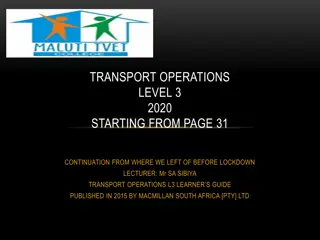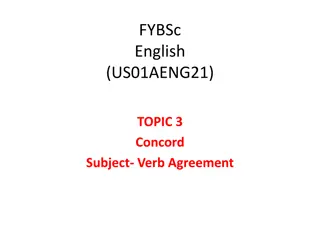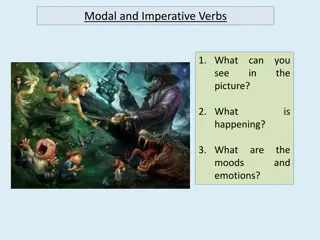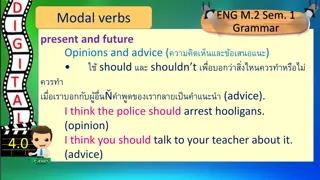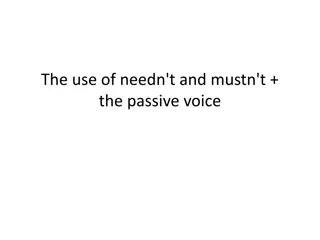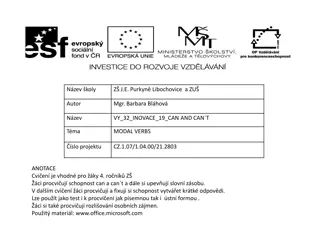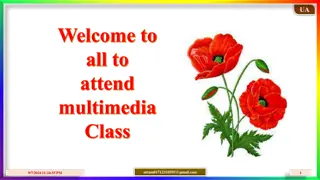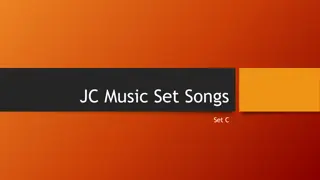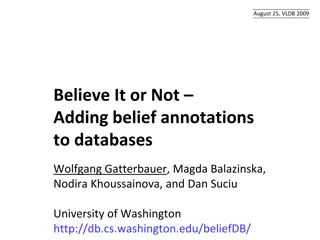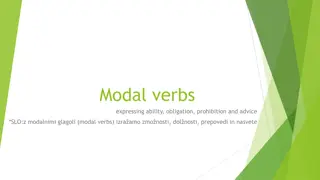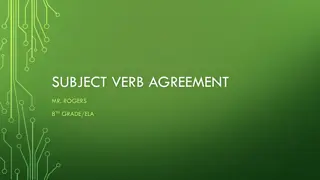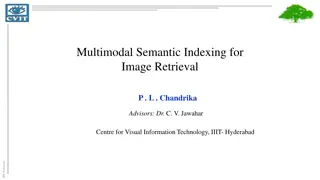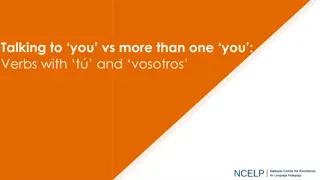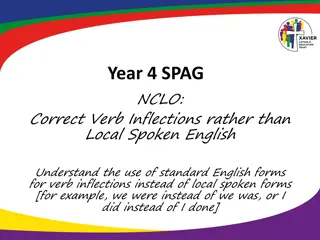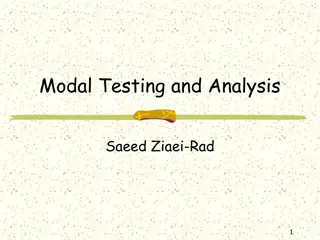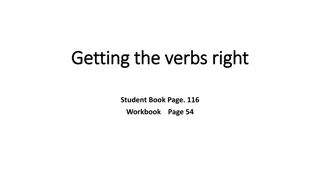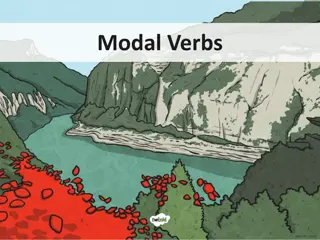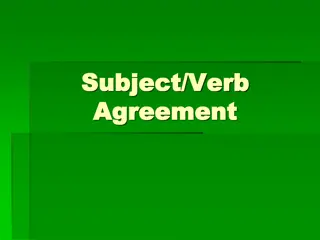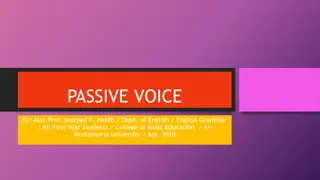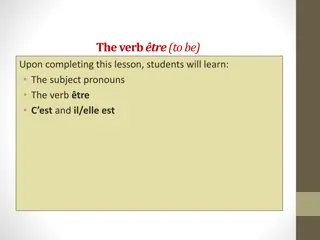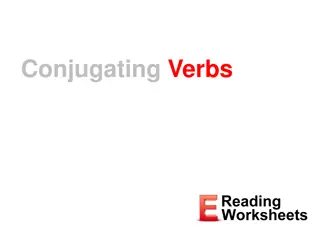Dos & Don'ts: Traffic Signs and Modal Verbs
Learn the meaning of traffic signs and practice using modal verbs in this English lesson. Improve your reading, listening, and writing skills.
8 views • 33 slides
Passive verb forms
Passive verb forms involve using "be" in a specific tense along with the past participle of a main verb to change the object of an active sentence into the subject of a passive sentence. The passive voice is commonly used in formal writing when the doer of the action is unknown, obvious, or purposel
2 views • 13 slides
MAKING RECOMMENDATIONS
Providing recommendations is a crucial skill in both spoken and written English, especially for tasks like formal essays, reports, proposals, and letters. This guide covers different ways to give recommendations using modal verbs, passive voice, gerunds, and more. Get insights on modal/semi-modal ve
5 views • 16 slides
Understanding Modal Verbs in English
Modal verbs, also known as modals, are auxiliary verbs that express attitudes and levels of certainty in English. They serve various purposes, such as indicating certainty, ability, permission, and making requests. Modal verbs like can, could, may, might, will, would, must, shall, should, and ought
0 views • 19 slides
Understanding Modal Verbs: Epistemic and Deontic Uses
Modal verbs, such as can, could, may, must, will, and should, play a crucial role in expressing modality in English. This content discusses the epistemic and deontic uses of modal verbs, illustrating how they convey likelihood, ability, permission, suggestions, obligations, and advice. Explore the n
0 views • 34 slides
Understanding Passive Voice and Verb Forms in English
Explore the concept of passive voice in English grammar through examples and explanations of modal verbs, infinitives, gerunds, and verb forms. Learn how to form passive sentences and identify different verb structures. Practice converting active voice sentences to passive voice for a deeper underst
1 views • 9 slides
Understanding Intermodal Transport Operations in Supply Chains
Explore the interrelationship of transportation services, multi-modalism, and safety legislation in the field of transport operations, referencing a comprehensive learner's guide. Topics covered include seamless supply chains, modal options, safety legislation, modal movement requirements, and more.
1 views • 14 slides
Understanding Subject-Verb Agreement in English Sentences
Subject-verb agreement is crucial in English grammar to ensure sentences are grammatically correct. The subject of a sentence must agree with the verb in terms of gender, number, person, and case. Incorrect use of verb can lead to ungrammatical sentences. Learn how the subject and verb should match
0 views • 28 slides
Understanding Modal and Imperative Verbs: Usage and Examples
This content covers the explanation and examples of modal verbs, which express certainty, possibility, and obligation, as well as imperative verbs that denote commands and orders. Learn to identify and use these verb types accurately and creatively through practical examples and engaging activities.
1 views • 12 slides
Understanding Verb Forms and Tenses in English Grammar
Learn about verb forms and tenses in English grammar, including the five forms of every English verb, the differences between regular and irregular verbs, and how to use verb tenses such as present, present perfect, and present participle. Discover how to apply present tense in various contexts and
1 views • 15 slides
Understanding English Modal Verbs: A Visual Guide
Explore the world of English modal verbs through engaging infographics covering must, can, may/might, could, and should. Learn about their usage in sentences and grasp the nuances of expressing ability, permission, obligation, and possibility. Dive into the explanations with visual aids depicting sc
0 views • 33 slides
Understanding Modal Verbs in English Grammar
Explore the nuances of modal verbs in English grammar through opinion, advice, and exercises. Learn how to use modal verbs like should, ought to, can, must, and may in present and future contexts. Enhance your language skills with examples and exercises highlighting the correct usage of modal verbs.
0 views • 12 slides
Effective Use of "Needn't" and "Mustn't" in Passive Voice
Understanding when to use "needn't" and "mustn't" in the passive voice can enhance your language skills. "Needn't" is used to express lack of necessity, while "mustn't" indicates prohibition or strong advice. Incorporating these modal verbs in the passive voice adds depth and clarity to your communi
0 views • 4 slides
Modal Verbs Exercise - Can and Can't Practice Activities
Enhance students' ability to use modal verbs can and can't through engaging exercises focusing on forming questions and short answers. Utilize the provided images to prompt students to complete sentences and questions with appropriate modal verbs.
0 views • 5 slides
Understanding Subject-Verb Agreement in English Grammar
In this multimedia class session, Assistant Head-teacher Uttam Adhikary introduces the concept of subject-verb agreement, emphasizing the importance of matching singular subjects with singular verbs and plural subjects with plural verbs. Through engaging examples and presentations, students will lea
0 views • 41 slides
Overview of Sacred Music: Plainchant, Gregorian Chant, and Modal Music
Delve into the world of sacred music with a focus on Plainchant, Gregorian Chant, and Modal Music. Explore the history, characteristics, and unique features of these musical forms, ranging from the reverent tones of Salve Regina to the intriguing melodies of Modal Music. Discover the textures, moods
0 views • 10 slides
Managing Belief Annotations in Databases: A Modal Logic Approach
Explore the concept of belief databases that enable data curation based on modal and default logic in a relational model. The work discusses managing inconsistent views in community databases and presents a motivating application scenario to illustrate the challenges and solutions in handling belief
0 views • 34 slides
Understanding Modal Verbs for Ability, Obligation, Prohibition, and Advice
Modal verbs play a crucial role in expressing ability, obligation, prohibition, and advice in English. They help convey various nuances in meaning such as capability, necessity, restrictions, and suggestions. By exploring modal verbs like "can", "could", "must", and others, you can develop a deeper
0 views • 9 slides
Understanding Subject-Verb Agreement in English Sentences
Explore the concept of subject-verb agreement through examples about the human body. Learn about singular and plural nouns affecting verb usage, common patterns in verb endings, and exceptions to verb conjugation rules in English sentences.
0 views • 15 slides
A Guide to Subject-Verb Agreement Basics
Understand the essentials of subject-verb agreement in sentences. Learn how singular subjects match singular verbs and plural subjects pair with plural verbs. Discover key rules, including handling words between the subject and verb, dealing with prepositional phrases, and recognizing subject placem
0 views • 7 slides
Power System Dynamics and Stability: Modal Analysis and PSSs
This lecture discusses modal analysis and Power System Stabilizers (PSSs) in power system dynamics and stability, covering topics such as eigenvalue calculations, generator models, and exciter effects. Key papers and examples are provided to enhance understanding and application in power systems eng
0 views • 27 slides
Multimodal Semantic Indexing for Image Retrieval at IIIT Hyderabad
This research delves into multimodal semantic indexing methods for image retrieval, focusing on extending Latent Semantic Indexing (LSI) and probabilistic LSI to a multi-modal setting. Contributions include the refinement of graph models and partitioning algorithms to enhance image retrieval from tr
1 views • 28 slides
English 2nd Paper Class Lesson on Verb Conjugation
This English 2nd paper class lesson focuses on verb conjugation. The lesson covers the formation of verbs, changes in verb tenses, and provides examples of strong, weak, and same formation verbs. Students will enhance their understanding of verb structures through this interactive session. Homework
1 views • 11 slides
Spanish Verb Endings for Addressing One Person vs. Multiple People
Spanish uses different verb endings for addressing one person (tú) and multiple people (vosotros). This resource provides examples of regular Spanish verbs with endings for one person and more than one person, as well as exercises to practice identifying the correct verb forms. Visual aids and enga
0 views • 21 slides
Understanding Verb Inflections in Standard English
Verbs are essential in language as doing words, representing actions and states of being. Verb inflections involve changes in form based on tense, number, and person. Standard English ensures clear communication by using correct verb forms. Practice identifying correct verb inflections for "to be" t
0 views • 14 slides
Understanding Modal Verbs in Grammar - Mega Goals 6 Unit 1 Everyone Makes Mistakes
Modal verbs play a crucial role in expressing abilities, possibilities, and obligations in English grammar. This lesson from Mega Goals 6 Unit 1 covers modal verbs, passive voice, and past models, offering a comprehensive overview through various activities and examples.
0 views • 25 slides
Understanding Modal Testing and Analysis in Structural Dynamics
Modal testing and analysis play a crucial role in understanding the behavior of structural systems under various conditions like undamped, viscously damped, and hysterically damped scenarios. This analysis involves the study of single-degree-of-freedom systems, undamped systems for free and forced v
0 views • 23 slides
Mastering Verbs - Practice Exercises and Examples
Enhance your verb skills with practice exercises and examples related to verb usage in different contexts. Improve your understanding of verb tenses, forms, and usage through engaging activities and visual aids. Perfect for students looking to sharpen their verb skills in grammar and writing.
0 views • 8 slides
Understanding Modal Verbs: Usage and Examples
Modal verbs are auxiliary verbs that are used in conjunction with main verbs to express various meanings such as possibility, likelihood, necessity, and more. Common modal verbs include may, must, could, should, and will. They play a crucial role in indicating the level of certainty or permission in
0 views • 16 slides
Understanding Modal Verbs in English
Modal verbs in English such as 'must', 'have to', 'mustn't', and 'don't have to' are used to express obligations, prohibitions, and lack of necessity. 'Must' and 'have to' convey internal and external obligations, while 'mustn't' indicates prohibition and 'don't have to' implies lack of necessity. E
0 views • 14 slides
Encouraging Shift to Rail for Sustainable Travel
Explore strategies and insights on encouraging a modal shift to rail transport for a more sustainable travel future. Join industry experts at the GBTA Sustainability Summit to discuss modal share, market trends, and the role of high-speed rail in reducing emissions. Learn about sustainability, multi
0 views • 6 slides
Heisenberg and the Incomplete Ability of Quantum Mechanics
A nuanced exploration of Heisenberg's role in the history of Modal Interpretations, revealing how he anticipates MIs. Discussions include contemporary views, Dieks' explanations on modal interpretations, and Heisenberg's stance on quantum propensities. The presentation emphasizes the transition from
0 views • 14 slides
Understanding Subject-Verb Agreement in Grammar
Explore the importance of subject-verb agreement in sentences, where a singular subject requires a singular verb and a plural subject needs a plural verb. Learn how to match subjects and verbs correctly to maintain agreement. Discover tips, examples, and resources to enhance your grammar skills effe
0 views • 73 slides
Understanding Hebrew Verb Forms: Qal Qatal and Piel Qatal Paradigms
Explore the rules and nuances of using definite articles with prepositions, verb forms, and verb charts in Hebrew. Learn how to identify and read the Qal Qatal and Piel Qatal paradigms, and understand the significance of prepositions with the definite article. Dive into verb charts for Qatal and dec
0 views • 25 slides
Exploring the Concept of Dare in Language Usage
The concept of daring, both as a verb and a strong modal verb, is examined through examples and explanations. It delves into the use of "dare" to signify courage, challenge, and risk-taking in various contexts like discussions and debates.
0 views • 4 slides
Understanding Passive Voice in English Grammar
Passive voice in English occurs when the subject receives the action of the verb. This involves changing the order of subject and object, using the auxiliary verb "to be" in the tense of the active voice, and adding the past participle of the main verb. Various tenses can be used in passive voice co
0 views • 5 slides
Mastering French Verb "Être" - Lesson Overview and Practice Exercises
This lesson focuses on the irregular verb "être" (to be) in French. You will learn about subject pronouns, conjugation of the verb, and how to use "c'est" and "il/elle est". Practice exercises are provided to reinforce your understanding. By the end, you'll be confident in using this essential verb
0 views • 5 slides
Understanding Verb Conjugation in Grammar
Explore the world of verb conjugation in grammar, from changing verb forms to show time and tense to ensuring subject-verb agreement. Learn about helping verbs, statements contrary to fact, and how verb conjugation indicates completion. Dive into this essential aspect of language to enhance your und
0 views • 18 slides
Understanding Multi-Modal Transportation in Logistics
The content covers concepts such as inter-modal and multi-modal transportation, seamless supply chains, standard containers, swap bodies, cellular container ships, and unaccompanied road semi-trailers in the context of transportation operations. It explains the meanings and functions of various mode
0 views • 14 slides
Effective Language Learning: Vocabulary, Grammar, and Modal Verbs Activities
Enhance your language skills with engaging vocabulary exercises, definitions matching, and practice with modal verbs. Dive into a variety of educational tools, improve your understanding with video explanations and PDFs, and master different types of present modal verbs. Elevate your language learni
0 views • 16 slides






